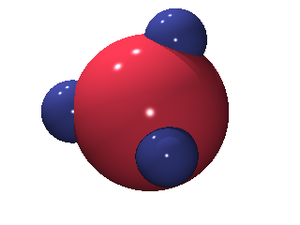Anisotropic particles with tetrahedral symmetry: Difference between revisions
Jump to navigation
Jump to search
Carl McBride (talk | contribs) m (Added some internal links) |
Carl McBride (talk | contribs) m (Moved location of first reference) |
||
| Line 1: | Line 1: | ||
[[Image:patchy_4.png|thumb|right| Artists impression of a tetrahedral patchy particle]] | [[Image:patchy_4.png|thumb|right| Artists impression of a tetrahedral patchy particle]] | ||
The [[Phase diagrams |phase diagram]] of the tetrahedral [[Kern and Frenkel patchy model | Kern and Frenkel ]] [[patchy particles | patchy model]] <ref>[http://dx.doi.org/10.1021/jp9081905 F. Romano, E. Sanz and F. Sciortino "Role of the Range in the Fluid−Crystal Coexistence for a Patchy Particle Model", Journal of Physical Chemistry B '''113''' pp. 15133–15136 (2009)]</ref> | The [[Phase diagrams |phase diagram]] of the tetrahedral [[Kern and Frenkel patchy model | Kern and Frenkel ]] [[patchy particles | patchy model]] exhibits the following solid phases<ref>[http://dx.doi.org/10.1021/jp9081905 F. Romano, E. Sanz and F. Sciortino "Role of the Range in the Fluid−Crystal Coexistence for a Patchy Particle Model", Journal of Physical Chemistry B '''113''' pp. 15133–15136 (2009)]</ref>: | ||
[[Building up a diamond lattice |diamond crystal]] (DC), | |||
[[Building up a body centered cubic lattice | body centred cubic]] (BCC) and [[Building up a face centered cubic lattice |face centred cubic]] (FCC). The gas-liquid [[critical points | critical point]] becomes metastable with respect | [[Building up a body centered cubic lattice | body centred cubic]] (BCC) and [[Building up a face centered cubic lattice |face centred cubic]] (FCC). The gas-liquid [[critical points | critical point]] becomes metastable with respect | ||
to the diamond crystal when the range of the interaction becomes short (roughly less than 15% of the | to the diamond crystal when the range of the interaction becomes short (roughly less than 15% of the | ||
Revision as of 13:51, 10 May 2010

The phase diagram of the tetrahedral Kern and Frenkel patchy model exhibits the following solid phases[1]: diamond crystal (DC), body centred cubic (BCC) and face centred cubic (FCC). The gas-liquid critical point becomes metastable with respect to the diamond crystal when the range of the interaction becomes short (roughly less than 15% of the diameter).
In contrast to isotropic models, the critical point becomes only weakly metastable with respect to the solid as the interaction range
narrows (from left to right in the figure).
See also
References
Related reading
- Jiří Kolafa and Ivo Nezbeda "Monte Carlo simulations on primitive models of water and methanol", Molecular Physics 61 pp. 161-175 (1987)
- Jonathan P. K. Doye, Ard A. Louis, I-Chun Lin, Lucy R. Allen, Eva G. Noya, Alex W. Wilber, Hoong Chwan Kok and Rosie Lyus "Controlling crystallization and its absence: proteins, colloids and patchy models", PCCP 9 pp. 2197-2205 (2007)
- Flavio Romano, Piero Tartaglia and Francesco Sciortino "Gas–liquid phase coexistence in a tetrahedral patchy particle model", Journal of Physics: Condensed Matter 19 322101 (2007)
